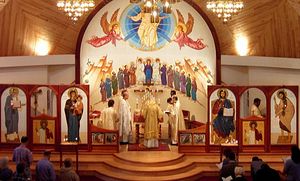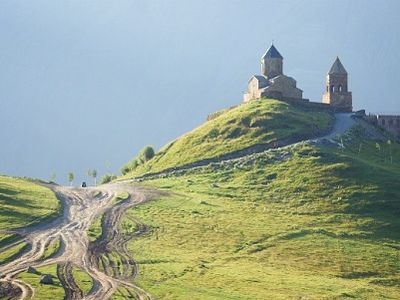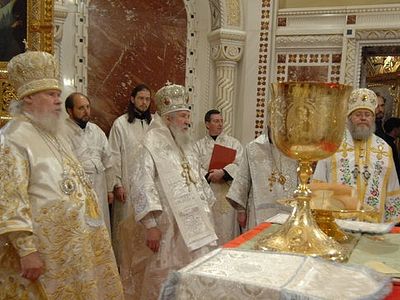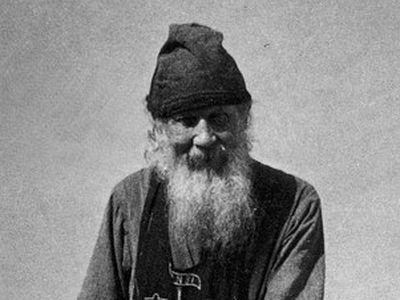Source: Alaska Dispatch Publishing
Last week I had the privilege of attending an Orthodox conference in Eagle River. One track dealt with theology, and the other track presented the development, history, and status of the Christian faith in the Middle East from the time of Christ forward. The Middle East presenter, the Rev. George Shaloub, pastor of The Antiochian Orthodox Basilica of St. Mary in Livonia, Michigan, talked about the courage exhibited by Christians in Syria despite some of the most desperate conditions in the world. St. John Orthodox Cathedral, where this conference was held, is connected with the Antiochian Orthodox Christian Archdiocese of North America which is an Archdiocese of the Patriarchate of Antioch and All the East. Two Syrian archbishops, Metropolitan Paul Yazigi and Archbishop Youhanna Ibrahim, were kidnapped two years ago. They’ve not been seen or heard from since. Whenever prayer was offered at this conference, or in any services at St. John Orthodox Cathedral, they were remembered by name in the prayer.
All of the people I met and heard at this conference exhibited the signs of having a settled faith, a stark contrast with much of the climate in religion today. I see the headlines, and you might too: “Megachurch pastor resigns due to affair,” “$65 million corporate jet pursued by prosperity pastor,” “Gunman kills at church service,” and “Church members swindled out of millions.” There is so much stress and disarray in religion, it is so refreshing to be among people with a settled vision and a faith that stretches back in time to the early Christian church. Some Orthodox have offered me suggestions for excellent spiritual books to gain more knowledge of this ancient faith. All of them are very spiritual suggesting a deeper dive into faith, and their ancient faith tradition. The faith of the past is just as vibrant in these times as it was then. If you’re interested, a search online for “top orthodox spiritual books” will reveal many insightful books, some of which may be available for free download.
Over the centuries, many Orthodox have become martyrs for God. A settled faith allows martyrdom. St. Ignatius, the third Bishop of Antioch, where believers were first called Christians, was a martyr in Rome, being fed to wild beasts. Before his death, writing in his epistle to the Romans said, “Pray, then, do not seek to confer any greater favor upon me than that I be sacrificed to God while the altar is still prepared; that, being gathered together in love, ye may sing praise to the Father, through Christ Jesus, that God has deemed me, the bishop of Syria, worthy to be sent for from the east unto the west. It is good to set from the world unto God, that I may rise again to Him.”
Many Christians are being slaughtered daily in the Middle East, and in other places in the world, as their faith is antithetical to the slaughterers. We need look no further than the 21 Egyptian Coptic Christians beheaded by the Islamic State in Libya, earlier this year, to understand how insidious this problem is. Many Christians in this world live their lives knowing that they may be snuffed out in an instant. In Anchorage we do not have the added burden, beyond our normal accidents and health problems, of anticipating car bombs, snipers, and all the other accouterments of warfare that could end our lives instantly. If we did have that burden, and were people of faith, we would very much need to have a settled faith knowing all was right with God and our fellow man. Additionally, faith and worship strengthens immune systems, lowers blood pressure, and adds years of life. For a detailed paper on the connections between faith and health visit tinyurl.com/pqd3mg8.
The Rev. George, in an interview with me during the conference said, “What gives you your humanity, is your spirituality, and the reinforcement that you are made in God’s image and likeness. Nobody talks about that anymore because it’s a difficult subject. ‘I cannot be like God.’ Nobody’s asking you, but at least remember that you have the possibility. Don’t damage yourself.”
A future column will feature my interview with this man of God who faithfully lives his settled faith, and has done so since his very beginnings as a boy in Syria. Placed in a religious boarding school at age 12, he has always gone where God has led him. He is now the pastor of the largest Orthodox church in America. I was very impressed with his settled faith.
A Barna Group study released Wednesday, "2015 Sees Sharp Rise in Post-Christian Population," evaluated 15 key metrics relating to Christian belief and practices related to that belief, comparing them to 2013 study results. Their data show that post-Christian status in America rose from 37 percent to 44 percent in just two years. Barna authors further stated “While the United States remains shaped by Christianity, the faith’s influence --particularly as a force in American politics and culture -- is slowly waning. An increasing number of religiously unaffiliated, a steady drop in church attendance, the recent Supreme Court decision on same-sex marriage, and the growing tension over religious freedoms all point to a larger secularizing trend sweeping across the nation.”
Recently, when in Paris, I stood in front of the Cathedral of Notre Dame. Standing at the end of the plaza facing the cathedral, I was amused to see a young woman sitting on the pavement about 50 feet away from me armed with a selfie-stick. She was repeatedly taking pictures of herself with the cathedral in the background. Each picture featured a different smile, searching for the proper one. Inside the cathedral, late afternoon Mass was said; there were more tourists than worshippers. A settled faith is living a focused life, not one of narcissism. I applaud those local believers who have settled faiths. I sometimes experience it, and it’s beautiful.
Chris Thompson is a religion scholar who visits local churches and writes about his experiences and matters of faith on his blog, churchvisits.com.
The views expressed here are the writer's own and are not necessarily endorsed by Alaska Dispatch News, which welcomes a broad range of viewpoints. To submit a piece for consideration, email commentary(at)alaskadispatch.com.




